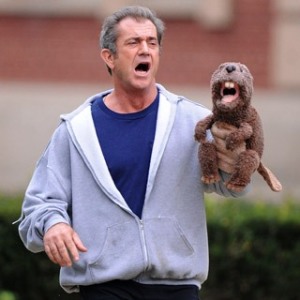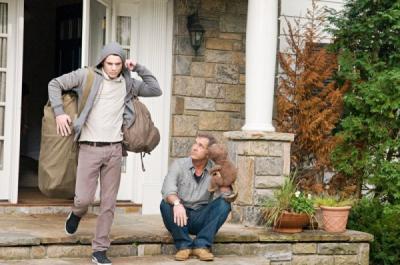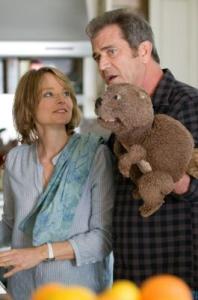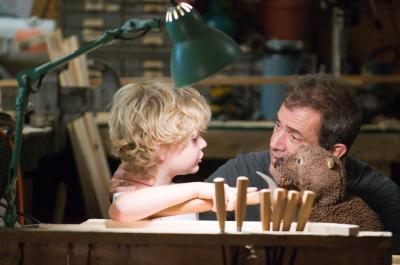By: debbie lynn elias
Before we plunge into my review of THE BEAVER, let’s get the elephant in the room out of the way right now. Mel Gibson. Much has been said, and much talk was even made during our round table interviews with director Jodie Foster, about Mel Gibson’s involvement in this project given his personal struggles which have spilled into the public forum. Foster should be congratulated not only for her loyalty to a friend and colleague, but for her ability to distinguish between the personal and professional sides of an individual’s life, and to make the best decision from a professional standpoint as to which actor will bring the best performance to her project. Had she not, we would have missed out on a wonderful, energetic, enlightening and entertaining performance by Mel Gibson who is, quite honestly, THE BEAVER.
Walter Black has it all. A nice house, wonderful family, money, a pool. A man born with a silver spoon in his mouth, Walter’s father was CEO of Jerry Co., a successful toy company. On his father’s passing two years ago, Walter was handed the company. Since that time, however, Walter has plunged deeper and deeper into the emotional black hole of depression. The company is floundering with no creative juices to propel it forward. Walter is estranged from his eldest son Porter who harbors such resentment and hatred towards Walter that he makes notes on Post-Its of each habit or trait he has that resembles Walter, posting the notes on the wall as a reminder of things to overcome and not fall victim to. For youngest son Henry, Walter is like a ghost, just wandering in and out with no emotion, no joy, no affection, no interest. For wife Meredith, she has tried her utmost to keep the family together and functioning but is now at her wits end. And she throws Walter out.

With one suit and a suitcase, Walter has nowhere to go. He has no friends. Now, he has no family. He has no life. Stopping at a liquor store and picking up a case of mix and match alcohol, he realizes he needs room in the trunk for his bottles of liquid painkillers, so he throws away everything in the trunk into a parking lot dumpster, everything that is but for a tattered old puppet that looks like a beaver. In his already drunken state, he is fascinated with the little dirty fur ball and retrieves it, popping it onto his hand like a glove. Knowing he has no life, Walter decides to do what he thinks is best for all. He checks into a motel with the intent of committing suicide. But Walter can’t even do that right. As he tries to hang himself from the shower rod using his tie and wearing a puppet, the shower rod breaks, tossing Walter to the floor in frustration. Hmmm. What to do now? Ah, the window ledge! So, Walter drags himself, shower rod and all (with shower curtain trailing behind of course) to the ledge and climbs up. But, thrown off balance by the train of the shower curtain, he staggers backwards off the ledge onto the patio and back into the hotel where slapstick disaster ensues with an old 32 inch picture tube television falls off the dresser, landing on him and knocking unconscious…or dead.
But death is not that easy. Come morning, we hear a strange voice. ” ‘ello, ‘ello. Get up Walter. Get up!” Huh? No one was in the room with him. Who can that be? Is he dead? Slowly Walter rouses from under the tv and sees the face of the encouraging voice. A…beaver??? The stuffed beaver? It can’t be. Beavers can’t talk. And this is only a tattered puppet. But the shock continues as THE BEAVER prattles on about what a no good Walter is but that he, THE BEAVER, is going to help him. He is his friend. His salvation. He will bring him back to life.

Confused, but alive, Walter heads home to see his family, with THE BEAVER a seemingly permanent fixture on his left arm. Walter communicates with no one. Only THE BEAVER speaks. Typed cards are distributed to all persons who come in contact with Walter, instructing them to only speak to THE BEAVER and that THE BEAVER will be speaking to them. Almost as if having a life of his own, THE BEAVER is intelligent and industrious, filled with energy and creativity. He does woodworking in the garage with Henry who is having the time of his life while Walter also joins in the antics between THE BEAVER and Henry. Father and son bond through THE BEAVER. Watching silently from afar, Meredith sees this as hogwash but will go along with the game on the pretext that this is some sort of therapy for Walter. But she, too, as days go by, sees a change in Walter and falls deeper under THE BEAVER’s spell, herself becoming more alive. Why THE BEAVER even comes up with an idea to try and help save Walter’s toy company. Porter, on the other hand, thinks everyone is crazy. But, Porter has his own problems. Damming up his own feelings and life, Porter, a brilliant student, has been running a business on the side, charging hundreds of dollars to write papers for fellow students. He’s also falling in love with the very unattainable Norah.

With THE BEAVER in their lives, the Blacks have opened up the dams that have blocked them from each other and from life. But what happens when Meredith demands that THE BEAVER go away and give her back just Walter.
As Walter and THE BEAVER Mel Gibson is amazing! And although this is clearly a situation of art imitating life, Mel proves why he is still a more than a viable acting commodity. The detail and energy he puts into being Walter and THE BEAVER is astounding. The hand mimicry to match his body’s physical movements – and particularly his own facial movements – is truly amazing. Gibson never misses a beat with maintaining this synergy of Walter and THE BEAVER. Noticeable, and obviously also due in part to director Foster, Gibson’s movements and manipulation of The Beaver is so nuanced at points, aligning with his face, as if replacing his head and face. Exceptional. According to Foster, it was her choice to place THE BEAVER on the left hand of right-handed Gibson. “He would have loved to have had the puppet on his right hand. But we needed him to do things like open doors and shake hands. We needed him to do a whole bunch of stuff with his right hand so we needed the puppet to be on his left. Most puppeteers obviously do puppets with their dominant hand, so it’s hard to do that [use opposite hand]. Plus, in this puppeteering you have to separate your thumb [from the fingers]. It’s really painful. After a while you cramp up.”
Gibson’s performance itself is fueled with a dry dark humor that explodes into laugh out loud funny, reverting to a depressed mania and ultimately, a seeming calmness rooted in reality. Foster “knew that he had a combination of the lightness and the wit that the character needed, but that he would also really understand the trouble. I know how his psyche works.”
The voice of THE BEAVER is all Gibson. Sounding very much like Michael Caine, “The accent was written in the script. Not Cockney, we turned it into more blue collar because it felt right as an alter-ego to a rich man who has had everything handed down to him; to have a blue collar puppet who is a leader, who’s somewhat remote from his emotions, who’s vital and who has a kind of testosterone about him. We didn’t want him to be warm and fuzzy. I think we wanted him to be menacing in some ways and to have a real strength of character. Mel really brought that to the process.”

Ironically, when Gibson skyrocketed to fame as Martin Riggs in LETHAL WEAPON, Riggs was a man classified as nuts/crazy and wanted to commit suicide. Gibson it seems has come full circle with Walter Black who is also classified as nuts/crazy and wants to commit suicide. Gibson tugs at every emotion with this multi-textural layered performance. He makes you laugh, he makes you cry, he makes you think, he makes you hope.
As Henry, Riley Thomas Stewart is an absolute scene stealer. The scenes between he, Gibson and THE BEAVER are magically charming. Anton Yelchin totally surprised me with his ability and timing delivering sarcasm, yet I felt his performance was a bit “off” when delving into stoic psycho-brooding and at times felt disingenuine. On the other hand, Jennifer Lawrence as Norah is cool, flippant, funny, charming, dramatic. She nails every aspect of teenage angst with a heartfelt genuineness. Sadly, Cherry Jones’ talents as Walter’s Vice-President seemed wasted. I would have liked to see more of her on screen and perhaps use her to establish more of the backstory of Walter Black and the Jerry Co., as that aspect of the story was not that well explained or executed.

And then there’s THE BEAVER himself. Why a beaver? According to Foster, “There’s something great about the industrious beaver who creates things and then destroys them. There’s also with woodland creatures, there was something about working in wood, about creativity, that it brought Walter back into working with his hands and being creative which is how he lost his vitality in the first place by losing that creativity.” Choosing the character of THE BEAVER before Gibson’s involvement, “In the midst of that there were a few things that we knew. We knew that we wanted him to have a childlike quality to it. We knew that we wanted him to be malleable so that you could see the hand underneath and that you always knew there was a man manipulating it. We knew that we wanted the audience to be aware that it was a prop. That this was not a person. It was a prop that was being handled by a man who was suffering.”
Written by Kyle Killen, conceptually, THE BEAVER is creative, intelligent, funny, emotionally dark and thought provoking, thanks to its offbeat method of addressing depression and the challenges and struggles of life. Very much a “message film” about leaving the darkness and coming into the light, growing, accepting and moving on, Killen lays the groundwork for the subject matter and uses the family as if spokes in a wheel with the issue of depression and Walter being the center and each family member and co-worker a spoke affected by Walter’s behavior. THE BEAVER monologues in the third act are quite intense, however, and perhaps too preachy to the average moviegoer, while the graduation address by Lawrence’s Norah is one that will easily connect with teens and adults alike. The father-son storyline gets a bit muddled at times in terms of Walter and Porter/Walter and his father and there are some holes in establishing the initial father-son dynamic which is the parallel and basis for the Walter-Porter dynamic. A key tool, however, is Riley Thomas Stewart’s Henry who brings the great innocence, acceptance and non-judgmental view of a child to the mix. Nice aspect of the story is the Norah-Porter subplot that explores the issues of secrets leading to heartbreak and emotional damage – again, seeming to parallel the unseen backstory of Walter and his father.

Given the importance of the issue of depression addressed by the film, THE BEAVER and Participant Media has embarked on the Social Action Campaign to supply audiences tools and resources to further explore the topic and continue the conversation on mental illness and depression. Something Foster is passionate about, “We worked a lot with National Alliance on Mental Illness (NAMI). It’s almost like a hotline, much like the Trevor Group which I work with a lot and was around when it was being founded. It’s grass roots; really just being on a phone line and being there for somebody to call and to ask questions. What they’ve found in terms of treatment is, depending on the circumstance, an incredibly effective thing and important component, is for people to understand that this is not something that no one else has ever lived through, and for them to be able to connect and to each out to other people. And to know that they’re not alone in this. That is the difference between life and death. I think the film kind of addresses that in an interesting way; on this large spectrum of depression, medical clinical depression that Walter’s feeling, but also the kind of sadness that we live through everyday of our lives. The answer is the same for both which is, you don’t have to be alone.”
After “Little Man Tate” Foster vowed she would never direct and star in a film again, yet she has and given the end result, was clearly up to the task with THE BEAVER. “It is challenging…[but] I find it completely easy to move between the two. There’s a couple liabilities. One, is it’s very difficult on your relationship with the other actors, so you have to know the other actors. I knew Mel. He’d acted and directed. He’s a completely unneurotic actor. There’s no, “how’s my hair”. He’s just very uncomplicated in how he works so I knew that that wouldn’t be a problem. But the one bad thing is that you don’t get choices from yourself that you might have gotten from another actor. You get what you anticipated and what you asked for, but you don’t get surprises. That’s the one thing that I missed, that I missed in the cutting room – I wish I had more surprises.”
Solidly executed from a technical standpoint, lighting and lensing, production design are all reflective of the emotion and mood of the story. What is particularly notable though is Foster’s use of music which is exemplary in setting the tone and signifying mood changes of Walter/THE BEAVER. Very subtle and seamless.
Like a beaver itself, THE BEAVER is a conscientious, industrious and creative film that not only gives us one of the best performances of the year with Mel Gibson, but builds hope in shedding a light on the issue of depression.
Walter Black/The Beaver – Mel Gibson
Meredith Black – Jodie Foster
Porter Black – Anton Yelchin
Henry Black – Riley Thomas Stewart
Norah – Jennifer Lawrence
Directed by Jodie Foster. Written by Kyle Killen.












